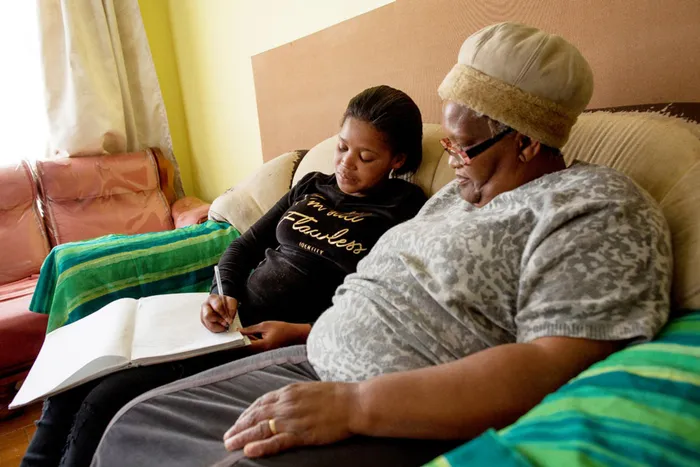
Sinethemba Kuse, 18, of Khayelitsha says the new drugs gave her a second chance in life and must be given to more people. Picture: Sydelle WIllow Smith Sinethemba Kuse, 18, of Khayelitsha says the new drugs gave her a second chance in life and must be given to more people. Picture: Sydelle WIllow Smith
Cape Town - Two newly introduced tuberculosis drugs, delamanid and bedaquiline, are creating hope that drug-resistant TB may be cured much quicker, recent data from Khayelitsha TB patients shows.
A study by Médecins Sans Frontières (MSF) carried out in South Africa, India and Armenia showed that almost three quarters (74%) of patients with drug-resistant TB, who received a combination of these drugs for six months, achieved "culture conversion", an early indicator that treatment may be successful.
Culture conversion is a positive prognostic marker indicating that a patient is recovering from TB and is no longer infectious.
Khayelitsha is one of very few sites in South Africa to offer delamanid to people with drug-resistant TB, and one of several global locations where MSF is offering patients with limited treatment options the choice of delamanid, sometimes in combination with bedaquiline - the only other new drug-resistant TB drug to have been developed in the past 50 years and approved for use by the World Health Organisation.
The latest results, which were presented this weekend at the 48th Union World Conference on Lung Health in Mexico, is positive news for South Africa, which has poor cure rates of 48% for multi-drug resistant (MDR) TB and and a shocking 24% of extreme drug- resistant TB (XDR).
Bedaquiline was registered in South Africa three years ago and its uptake has been successful, with almost 7000 patients on it. Delamanid is, however, far behind. It is not yet registered and used only by a few patients.
On World TB Day this year, Health Minister Aaron Motsoaledi launched the Delamanid Clinical Access Programme (DCAP) for the treatment of MDR-TB patients to manage and treat drug-resistant TB.
The standard treatment for drug- resistant TB is up to two years and consists of at least five different drugs, including painful injections that can cause deafness in up to 50% of patients.
MSF’s Khayelitsha site is one of the few places in South Africa where delamanid is available. The latest study is the first big study to show the effectiveness of delamanid and bedaquiline combined. Little other research exists globally on the combined use of these two drugs.
An XDR patient, Sinethemba Kuse, 18, of Khayelitsha, who became the first adolescent to receive delamanid in February last year and was cured last month, said delamanid gave her a “second chance in life”.
Looking back on the treatment, she called for greater access to delamanid, saying that “a lot of people with drug-resistant TB suffer without hope”.
Kuse’s grandmother, Vuyiswa Madubela, rememembered how difficult it was for her family when her granddaughter, whose mother died when she was only a child, was diagnosed.
But for Madubela, who had taken Kuse into her care just days earlier, adding to four other family members, the pain was deeper as it put a strain on her as head of the family.
“That day, I lost hope. I thought she was going to die. During her first month with us it was terrible - she wouldn’t eat, we’d all just watch her. Everyone was sad. When I wanted to cry, I had to go outside,” she said,
By the end of December 2015 she started MDR treatment which included painful daily kanamycin injections.
By February last year, further test results on her sputum eventually showed resistance to the injectable agent and that Kuse actually had pre-XDR-TB . She needed new drugs and a change of treatment.
After making contact with MSF, Kuse was started on new treatment which combined bedaquiline and delamanid.
“The first few days she had nausea, wanting to vomit. I sat her down and I said: 'You have to accept this. You must talk to your tablets. You must give them an order and say I am in charge',” recalled Madubela.
“Not even a month later, she started speaking, even dancing. She started going to church, she’s singing in the church choir. Everyone wanted to know what happened,” she said.
MSF drug-resistant doctor Anja Reuter, who is based in Khayelitsha, said MSF used delamanid which has been endorsed by the WHO to replace the injectables in cases of resistance - was offered to Khayelitsha patients as a primary option for children and adolescents.
“Delamanid can also strengthen the treatment regimen for more complex cases, such as people living with other chronic diseases like diabetes, or HIV. It is a good option for HIV co-infected patients because it doesn’t require patients to change their antiretroviral treatment,” Reuter added.
MSF estimates that each year at least 7000 drug-resistant TB patients in South Africa could benefit from delamanid, but access is limited.
While the clinical access programme launched by Motsoaledi is a "progressive step forward", the MSF said the uptake is slow with only 10 of the 400 treatment courses pledged by pharmaceutical manufacturer Otsuka allocated to date.
This is in part because of the eligibility criteria which currently excludes people with XDR-TB, and patients on bedaquiline.
